Prebiotics are nutrients that help the beneficial bacteria in your stomach and intestines grow and multiply.
These probiotic bacteria feed off the “bacteria food” in prebiotics, and a healthy gut bacteria population is linked to better digestive health, immune system function, weight loss, improvements in mood, and reduction in stress.
With the health of your gut microbiome being one of the biggest medical frontiers of the 21st century, you want a prebiotic supplement that will keep your healthy gut bacteria (plus any probiotics you take through a supplement) flourishing.
We’ve evaluated and ranked the best prebiotic supplements on the market right now.
Research
Rankings
1. 1MD Complete Probiotics with Prebiotic Fiber
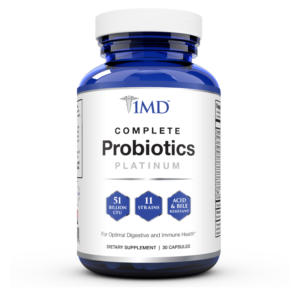
Click here for the lowest price
For those who’re serious about taking the most potent prebiotic, 1MD Complete Probiotics with Prebiotic Fiber is the best stuff you can get.
No other prebiotic supplement can compete with the 51 billion cultures and 11 unique strains with each serving.
Their patented “NutraFlora” Prebiotic Fiber is included to help assist in maintaining the vitality and growth of the Bifidobacteria and Lactobacilli strains.
Why is this important?
The prebiotic makes sure the cultures get the fuel they need to really make a difference in your gut”, says Dr. David Kahana MD, who is board certified in Pediatrics and Gastroenterology through the American Board of Pediatrics (ABP).
From overall immune health to providing your body with better digestion and gut health, 1MD Complete Probiotics with Fiber Prebiotics is one of the better daily habits you can have in the supplement space.
No “fillers.”
Made in the USA and in an FDA-approved facility.
BodyNutrition‘s all-around prebiotic supplement winner of 2023.
Click here for the lowest price
2. Performance Lab Prebiotic
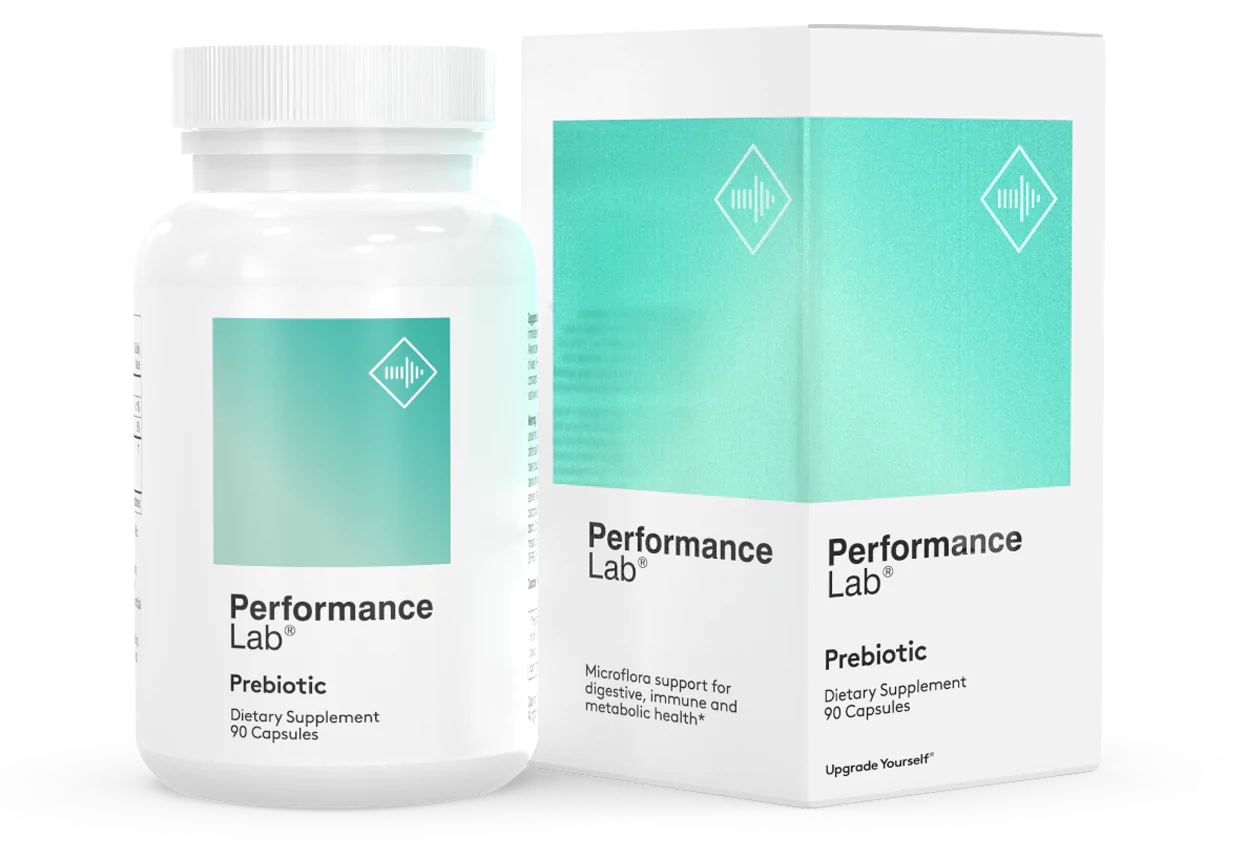
Click here for the lowest price
Performance Lab Prebiotic is a no-nonsense, single-ingredient (active ingredient) supplement designed to improve your gut health.
The active ingredient within Prebiotic by Performance Lab is Inulin-FOS, a combination of Inulin, a polysaccharide, and FOS (FructoOligoSaccharides), a natural sweetener found in fruit. Both Inulin and FOS are soluble fibers that can help improve digestive health.
Inulin-FOS is particularly hardy, able to survive traveling through the stomach and small intestine to the colon without being broken down. This means that it can feed probiotic bacteria and help to increase this “good” bacteria.
3. Garden of Life Dr. Formulated Organic Fiber Prebiotic
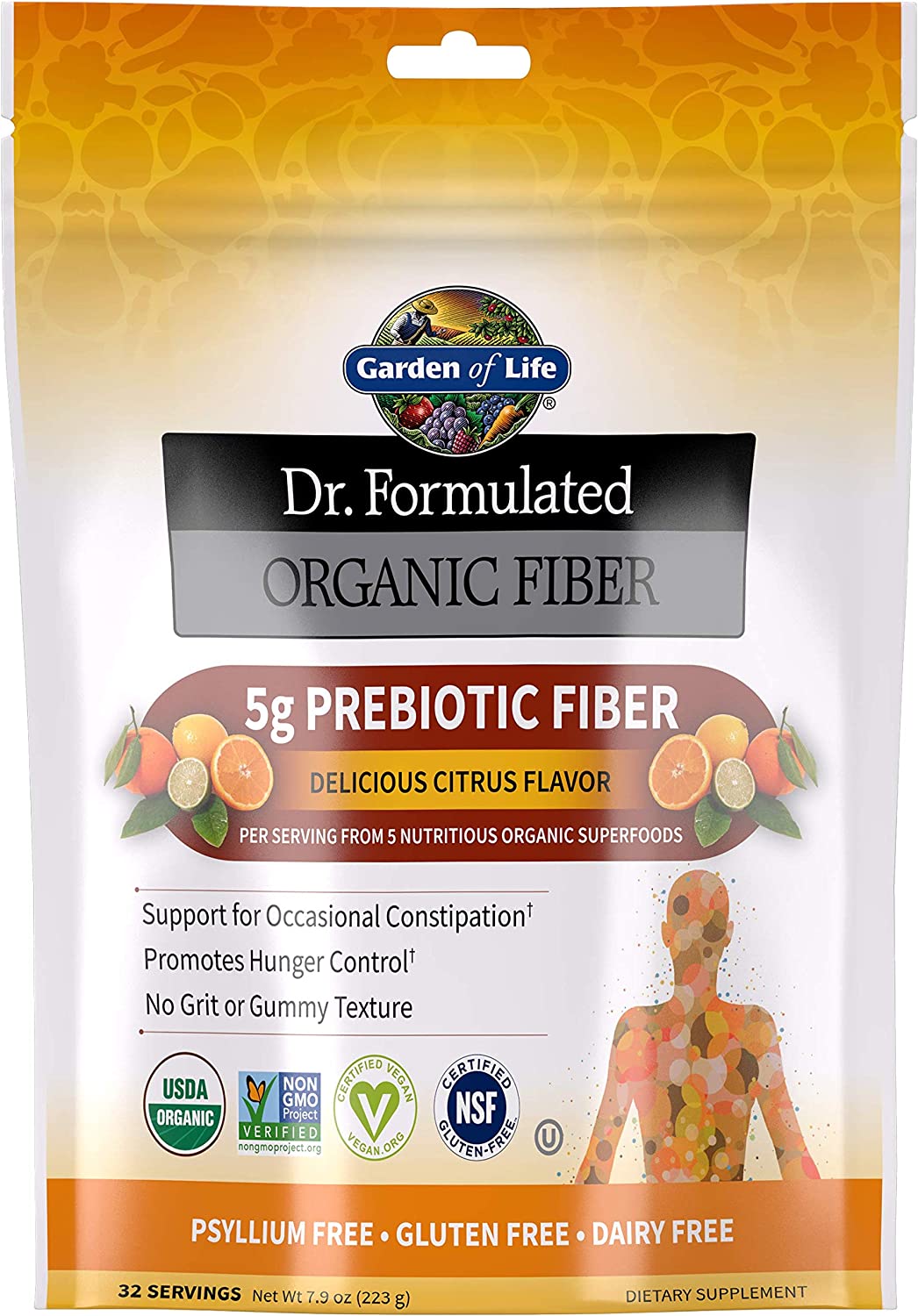
Garden of Life has a very carefully crafted fiber prebiotic that uses five different sources of fiber to create an optimal environment for probiotic bacterial growth.
By consulting with a nationally renowned expert in the body’s microbiome, Garden of Life chose their ingredients to gain some extra benefits from the plants that provide the fiber: baobab, apple, orange, cranberry, and acacia.
These plant materials may help curtail hunger as well, making this a good choice if you are taking a probiotic supplement and are also trying to lose weight. With these extra benefits and strong sources of fiber, it’s our top choice.
4. Hyperbiotics Prebiotic
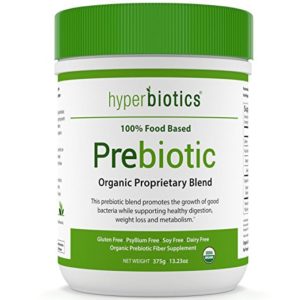
Hyperbiotics Prebiotic is a powder-based prebiotic supplement that contains fiber from acacia, Jerusalem artichoke, and green banana flour.
This provides a substrate and food source for beneficial bacteria in your stomach to multiply. The broad range of fibers and combination of starch from banana flour and fiber from plant materials make it suitable for a wide range of probiotic bacteria.
5. Dr. Tobias Prebiotic Digestive Support
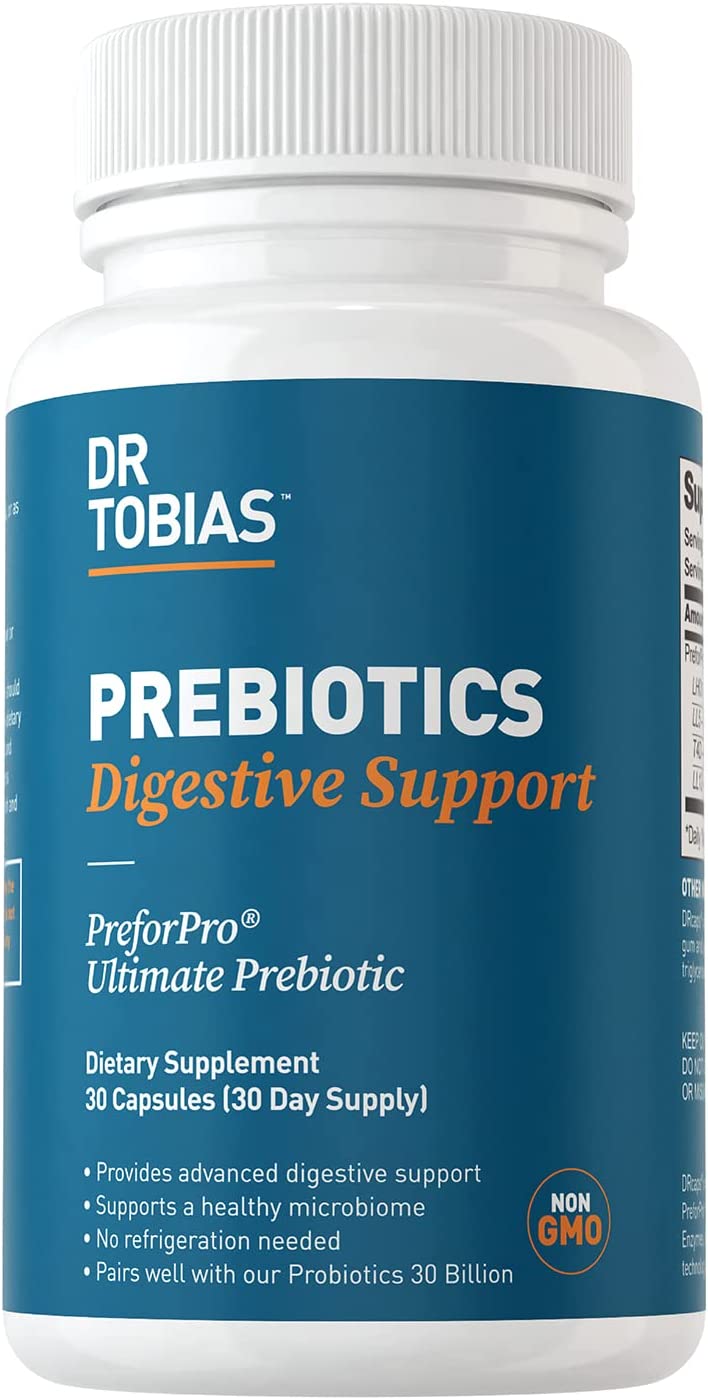
Dr. Tobias offers a prebiotic formulation that’s decidedly different from anything else on the market. While other supplements use fiber and starch to encourage good bacteria to grow, this product uses a patented formulation that targets and kills “bad” bacteria which frees up nutrients for good bacteria to grow and multiply.
While this is an unconventional approach, there are clinical trials supporting its efficacy, which makes it an excellent choice. Because it’s not fiber-based, it also avoids the bloating and gas that can result from a high-fiber prebiotic
6. Prebiotin
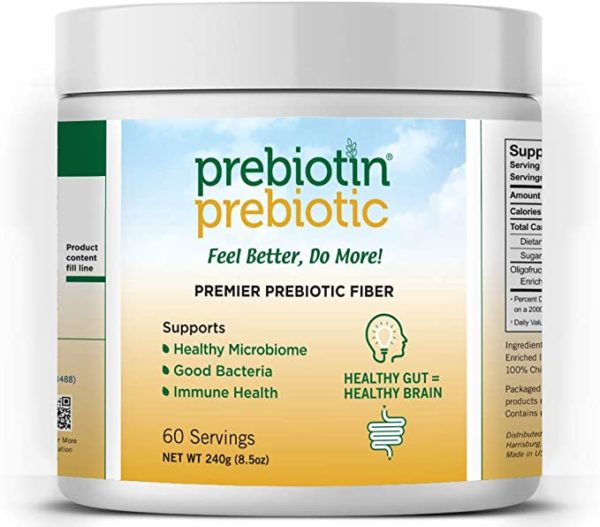
Prebiotin is a powder-based prebiotic that uses fiber from inulin, a plant material that’s rich in oligosaccharides. These long chains of sugar are a particularly effective source of food for probiotic bacteria.
The fiber content is lower than in some other supplements, but this should be offset by the oligosaccharide content, which works synergistically with the fiber.
7. BioSchwartz Advanced Prebiotic
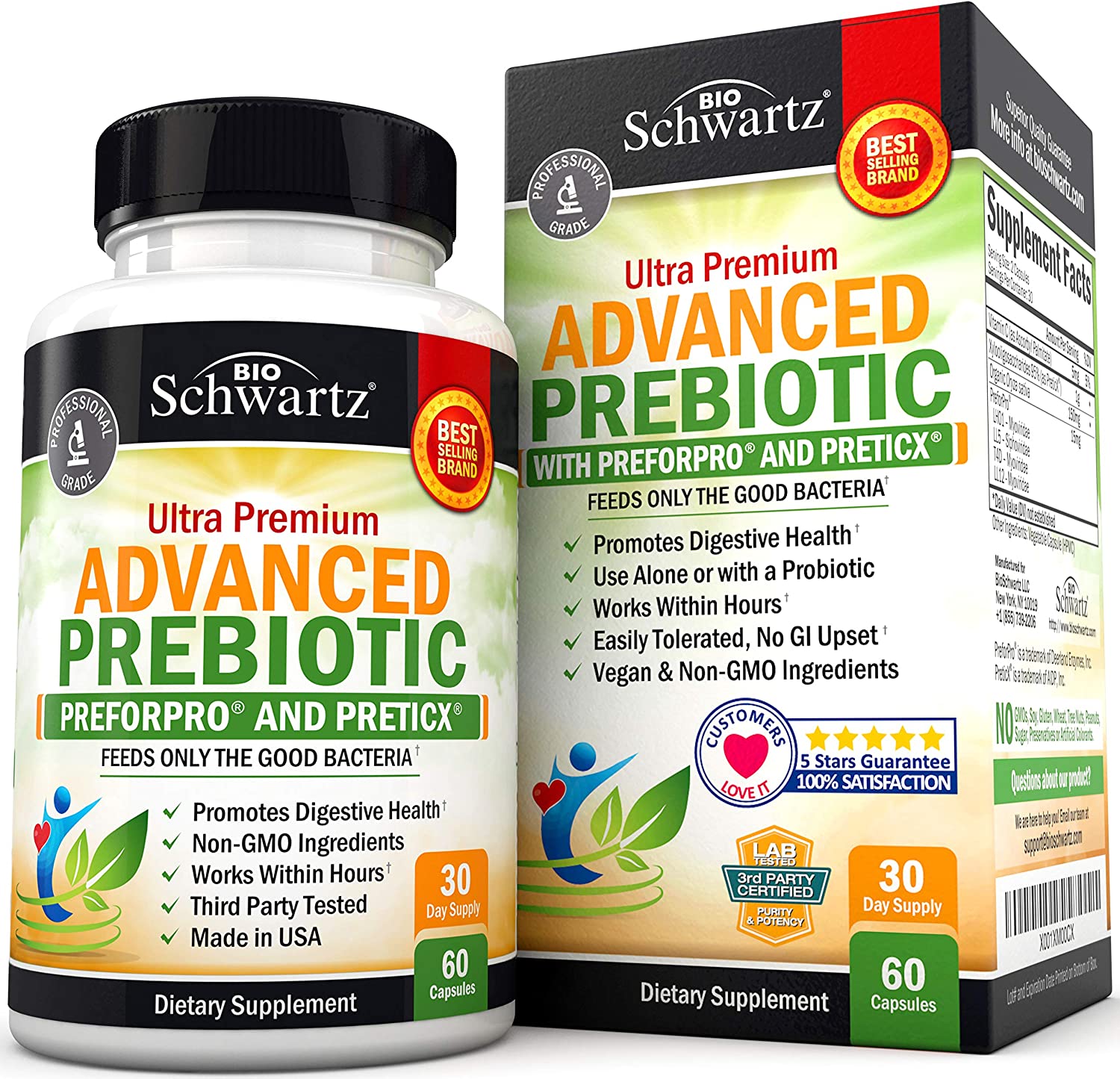
BioSchwartz makes a comprehensive prebiotic supplement that includes both oligosaccharides and advanced plant extracts that are designed to boost bacteria levels in your intestine. The variety of ingredients is good, but the plant extracts are hidden in a proprietary blend, which makes it slightly less attractive.
8. vH Probiotics and Prebiotics with Cranberry
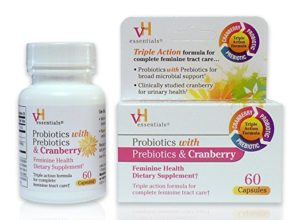
vH makes a specially formulated supplement that’s tailored to women specifically. This supplement combines the probiotic power of bacillus and lactobacillus probiotic colony forming units as well as inulin for oligosaccharides.
It also includes 500 mg of cranberry powder, which the company claims boosts probiotic growth. However, the consequence of so many ingredients is that the overall prebiotic content is quite low, and there is no fiber in this supplement either.
9. BeLive Probiotic Fiber Gummies
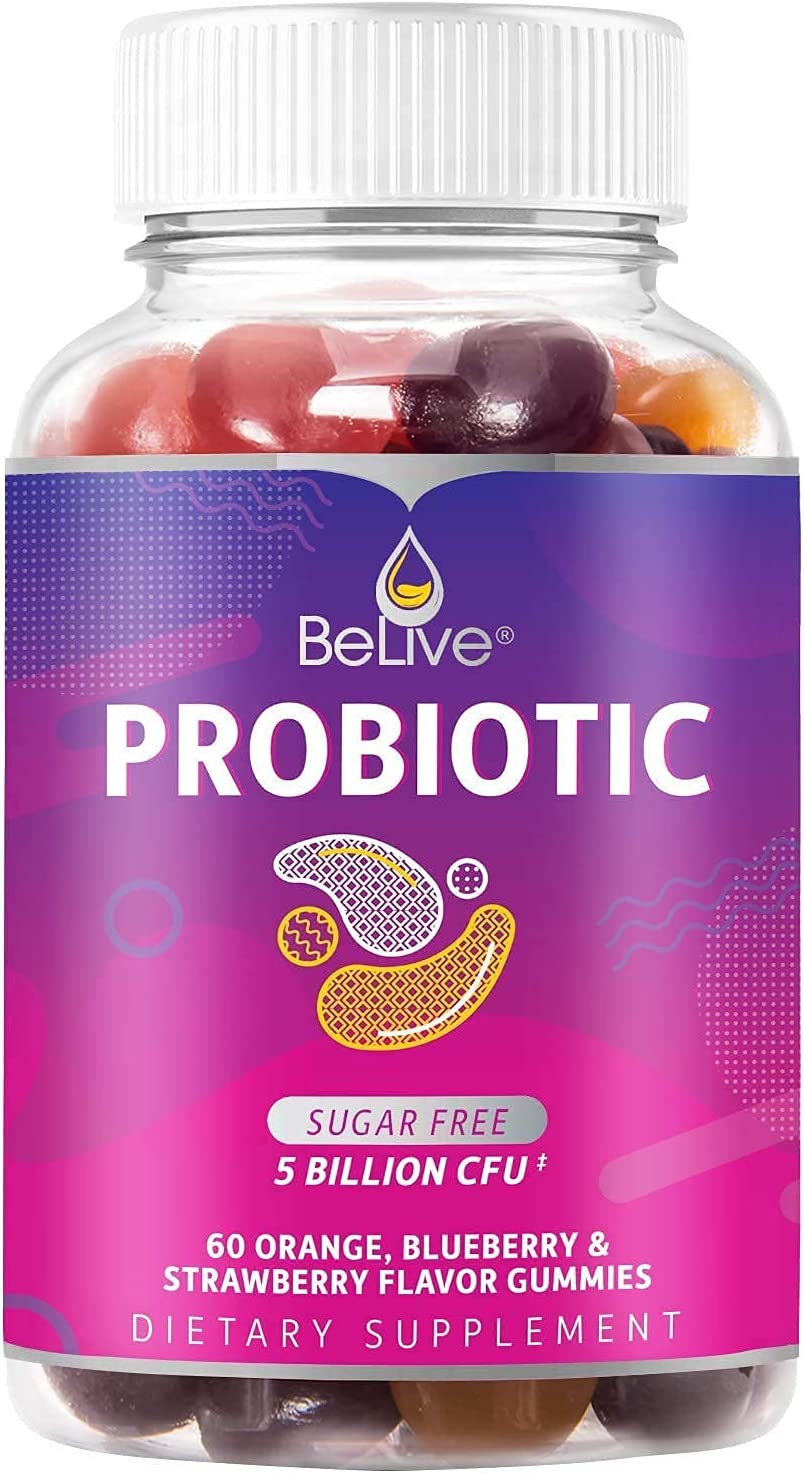
BeLive Probiotic Fiber Gummies are a good choice if you don’t like the taste of other fiber powders, or hate mixing powders into a drink.
There are some downsides, though: each gummy has only 1.6 grams of fiber, and is flavored with sugar alcohols, which don’t always sit well with everyone. They do, however, have a decent quantity of fructooligosaccharides to promote probiotic growth.
10. Regular Girl Prebiotic and Probiotic Blend
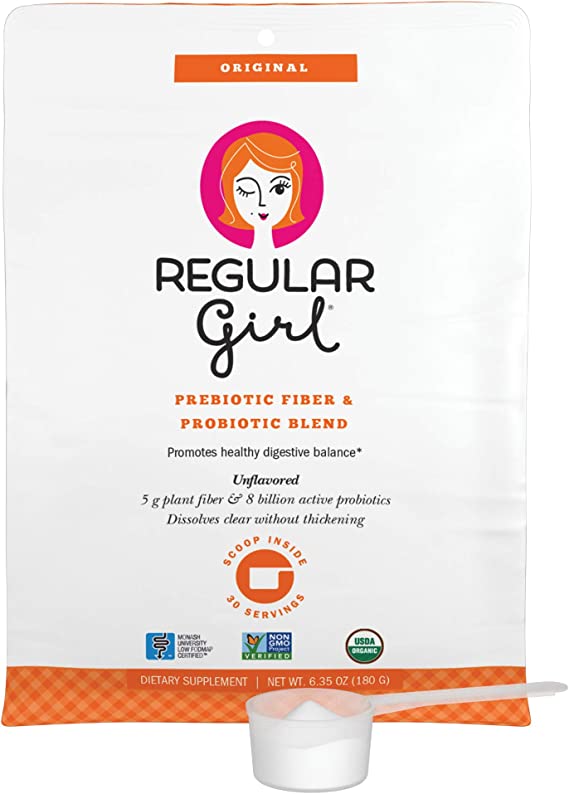
Regular Girl makes a women’s-specific blend of prebiotics and probiotics. The probiotic content is a high dosage (eight billion colony forming units), but it’s just one bacterial strain.
The prebiotic that Regular Girl uses is guar fiber, which provides a substrate and food for bacteria but doesn’t really distinguish itself in any particular way.
Category winners
Best prebiotic overall: 1MD Complete Probiotics with Prebiotic Fiber
1MD takes the crown thanks to its highly effective NutraFlora prebiotic fiber, which allows healthy intestinal bacteria to flourish. On top of that, 1MD Complete also provides an eye-popping 51 billion CFUs of probiotic bacteria, making it an easy pick for the number one spot.
Best prebiotic for athletes: Performance Lab Prebiotic
Tough strength or endurance training can do some real damage to your gastrointestinal health. Athletes can combat diarrhea, constipation, and bloating with Performance Lab Prebiotic, which uses a super-simple inulin and fructooligosaccharide (FOS) approach to foster healthier gut microbiomes.
Best prebiotic for women: Hyperbiotics Prebiotic
Many women don’t get enough fiber in their diet, which hurts the diversity of their gut bacteria. Hyperbiotics Prebiotics provides three different naturally occurring sources of fiber to nourish women’s probiotic bacteria.
Best prebiotic for diarrhea and constipation: 1MD Complete Probiotics with Prebiotic Fiber
For fighting gastrointestinal problems like diarrhea and constipation, it’s best to take prebiotics alongside high doses of probiotics—that way, you get healthy bacteria and nutrients to sustain them at the same time. 1MD excels in this department, providing fiber plus 51 billion CFUs of probiotic bacteria strains for better gut health.
Best prebiotic for weight loss: Garden of Life Dr. Formulated Organic Fiber Prebiotic
Garden of Life uses an all-natural fiber-based approach to nurturing healthy bacteria, making it great for weight loss. Not only do higher levels of probiotic bacteria make it easier to lose weight, the fiber itself acts as an appetite suppressant. Easily the top pick for people on a diet.
Best prebiotic and probiotic combination: 1MD Complete Probiotics with Prebiotic Fiber
While the traditional strategy for prebiotic supplements is using them to maintain an already-healthy gut microbiome, 1MD offers an all-in-one solution to supplying your body with new cultures of healthy bacteria, plus the nutrients they need to thrive.
Who should buy prebiotics?
Prebiotics are a great addition to your supplementation routine if you are looking to improve the quality of your gut bacteria, or enhance the efficacy of a probiotic supplement that you already take. Because of these benefits, a few specific categories of people should seriously consider them as a supplement.
People who want to improve their gut health. If you get frequent indigestion, constipation, and other GI problems, you might want to take steps to improve the health of your gut microbiome. Adding a prebiotic supplement with probiotic-specific nutrients can be one of these steps.
People who want to boost their mood. Up to 90% of your body’s serotonin is actually produced in your gut, and abnormal gut bacteria populations have also been linked to mood disorders like clinical depression. Supporting a healthy population of beneficial bacteria in your gut could help elevate your mood and alleviate feelings of stress, anxiety, and depression.
People who already take a probiotic supplement or eat a lot of probiotic foods. Prebiotics are only helpful if you already have some beneficial bacteria in your system. As such, they’re best combined with probiotic supplements or foods rich in probiotic bacteria strains, such as cheese, yogurt, kimchi, or kombucha. If you want to leverage the benefits of prebiotics, make sure you’re already taking or consuming a solid amount of live probiotic bacteria.
People who want to support a healthy immune system. Much of your body’s immune system regulation is linked to your gut, and having a healthy and flourishing population of healthy bacteria in your gut upregulates your immune system’s ability to fight off infections. On top of that, abnormal gut bacteria have been linked to autoimmune disorders such as Crohn’s disease, so a healthy gut bacteria population is an excellent way to support immune function.
How we ranked
When browsing for a prebiotic supplement, it can sometimes be hard to pin down what exactly constitutes a prebiotic versus a probiotic versus a run of the mill fiber supplement. Here are the criteria we used to identify the best products on the market.
Effective probiotic-promoting ingredients. A prebiotic may or may not contain live bacteria, but we required any product on our rankings to contain at least one ingredient that promotes the growth of probiotic bacterial strains.
That could mean fructooligosaccharides, fiber, or other compounds that can be digested as energy by probiotic bacteria.
No fiber-only or probiotic-only supplements. To make our rankings, we first discounted products that were only probiotic supplements, or only fiber supplements (i.e. those without any advanced prebiotic ingredients). Each of these categories of supplements have their own specific applications, but they aren’t the best tools for improving the quality of your gut microbiome.
Multiple natural sources of prebiotic nutrients. We gave top priority to prebiotic supplements that included multiple different sources of food for probiotic bacteria, such as the acacia fiber, Jerusalem artichoke, and green banana flour combination found in Hyperbiotics Prebiotic.
No single-ingredient supplements. At this point, we already had enough high-quality prebiotic supplements with multiple bacteria-beneficial ingredients that we ended up dropping the remaining prebiotics that had only a single prebiotic nutrient, such as Micro Ingredients Inulin Powder.
While inulin can be a great prebiotic, it’s outclassed by multi-ingredient supplements like Genesis Today Superfood Powder.
Extra bonus for live probiotic cultures. We gave a bit of extra weight to products that had live probiotic bacterial cultures, but didn’t require it.
We did not put much as much emphasis on how much bacteria a prebiotic had; remember, the purpose of a prebiotic is not to deliver bacteria themselves (if you want to do this, check out our probiotic rankings instead).
Some products that ended up highly ranked, like 1MD Complete Probiotics, do contain live bacteria, while others, such as Garden of Life Dr. Formulated Organic Fiber Prebiotic, did not.
Potent dose and pure ingredients. Our final criteria were purity, dosage, and efficacy. We ditched supplements that were packed with artificial flavoring, sugar for flavoring, or artificial colors. These just aren’t necessary in a prebiotic supplement, and in the case of sugar, could actually encourage the wrong kind of bacteria to grow in your intestines. If you have issues with the flavor (or lack thereof) of a powder-based prebiotic, you can always mix it into a green superfood drink or a protein shake.
Our final rankings represent the best prebiotics on the market right now, sorted by the potential of their ingredients to boost your body’s probiotic bacteria populations.
FAQ
Q: Is raw apple cider vinegar a prebiotic?
A: Technically, yes, as long as apple cider vinegar contains the “mother,” it contains some live bacteria. The mother is the cloudy sediment of bacteria and bacteria spores that convert the sugar in apples into vinegar, but there’s one important drawback, according to the University of Chicago’s Medical School (9).
This drawback is the fact that these bacterial strains haven’t been intensively studied for their health benefits. The probiotics with stronger evidence for beneficial effects come from other sources, such as dairy. An additional drawback to relying on apple cider vinegar as a probiotic is the fact that you can’t consume very much of it due to its acidity. Too much apple cider vinegar can cause erosion of the enamel of your teeth.
Q: Is Metamucil a prebiotic?
A: Since Metamucil is a fiber supplement, it does technically count as a prebiotic. However, we didn’t include Metamucil or any other fiber-only supplements in our rankings of the best prebiotic supplements on the market, because so many other supplements provide much more than just fiber to promote probiotic bacteria growth.
Fiber is digestible by probiotic bacteria strains like lactobacillus or bifidobacterium, so it does help increase their levels in your gut. However, when you combine fiber with other ingredients, like chicory root extract, you can get a much better boost to probiotic bacteria levels.
Q: Can prebiotics help you lose weight?
A: Yes, the evidence supporting prebiotic supplementation for weight loss has increased substantially in the past decade. There is definitely a connection between probiotic bacteria levels, and obesity (plus the health conditions linked to obesity, such as heart disease and type two diabetes).
Plenty of research supports using probiotic supplements to assist with weight loss, but more recent research has also tested using prebiotic ingredients, with strong success.
Supplementation with prebiotics is not an end-all-be-all solution for weight loss, but shifting your gut bacteria towards a more healthy balance can help increase thermogenesis and decrease your appetite. These effects make it a lot easier to lose weight.
Q: Are prebiotics good for kids?
A: Children are perhaps the one population that have been under-researched with respect to prebiotic supplementation: we just don’t have the research yet to know if kids respond differently to prebiotics than adults or the elderly.
More recently, research has expanded to look at older adults and even infants, but for now, healthy children remain under-researched. Within a few years, we should know more about whether kids also benefit from prebiotic supplementation, and if so, whether there are any particular considerations that need to be taken.
Related articles
Recap
Prebiotic supplements have a remarkable range of benefits, thanks to the wide-reaching importance of your gut bacteria. A prebiotic supplement can help improve inflammatory bowel diseases, boost the functioning of your immune system, prevent weight gain, decrease your stress levels, and improve your mood.
These benefits are impressive, but all of these functions revolve around the ability of a prebiotic supplement to increase the levels of the good bacteria in your digestive tract.
The best strategy is to take a prebiotic supplement that includes both fiber and oligosaccharides or inulin, and aim for a dosage of at least four grams per day. If you get bloating or gas, you can try a lower dosage for a while as your body becomes acclimated to the increased levels of probiotic bacteria in your stomach and intestines.
From a dosage standpoint, it appears that a higher dose creates a stronger boost in good bacteria levels, so to the extent that you can tolerate doses of five or ten grams of prebiotic bacteria per day, you should strive for doses in that range.
For BodyNutrition‘s #1 prebiotic supplement recommendation, click here.